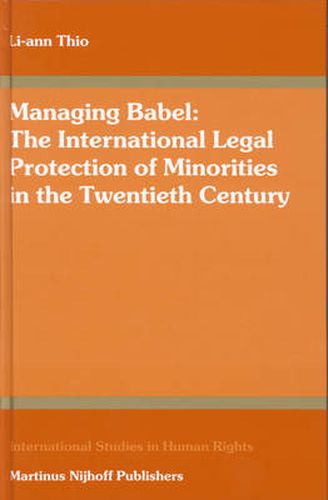Readings Newsletter
Become a Readings Member to make your shopping experience even easier.
Sign in or sign up for free!
You’re not far away from qualifying for FREE standard shipping within Australia
You’ve qualified for FREE standard shipping within Australia
The cart is loading…






Minority protection is integral to a civilised standard of internal good governance. The goal of promoting friendly inter-group relations within states highlights the linkages between constitutionalism and the extending reach of international law in shaping domestic governance and structuring relations between the state, non-state communities and individuals. While law per se cannot guarantee the security and integrity of minority groups, law and legal institutions play a role in promoting a tolerant and pluralistic environment and a multicultural ethos that appreciates, rather than resents, ethno-cultural diversity. This book is a comprehensive, modern study of the important field of international protection of minority rights, focusing on 20th century development, the Age of Institutionalisation and Conflict where the age-old problem of minority protection was first innovatively addressed through systematic international guarantees underwritten by a permanent institution. Minority rights regimes, which address the issue of group identity and autonomy, have essentially been a stabilising force, buttressing state survivability in the face of claims to self-determination or secession. These serve to promote the peaceful co-existence of distinct ethno-cultural groups, captured by the metaphor of ‘Babel’, within existing states. Despite overlaps, the content of minority protection is more modest than the claim of indigenous groups for collective rights or peoples’ rights to self-determination. As part of the contemporary corpus of human rights norms, minority protection may be appreciated as an aspect of the evolving content of the ‘internal’ dimension of the right to self-determination. Chapter 1 introduces some key definitional and conceptual problems in the field of minority protection and presents a brief historical review of international approaches up to 1919. Chapter 2 discusses the League of Nations era. Chapter 3 examines approaches towards minority protection after World War Two as reflected in the drafting of the United Nations Charter and efforts to protect minorities outside the UN regime. In this period, discussed in Chapters 4 and 5, minorities’ issues remained largely submerged within the UN project of promoting universal individual human rights. Chapter 6 addresses the post-1989 revival in minorities’ issues within the UN; Chapter 7 offers a succinct overview of what might be considered a parallel history with respect to the development of regional human rights schemes and what these afford to minority protection, closing with concluding observations. Meticulously researched, this volume offers a valuable synthesis of this important but often heart-breaking field.
$9.00 standard shipping within Australia
FREE standard shipping within Australia for orders over $100.00
Express & International shipping calculated at checkout
Minority protection is integral to a civilised standard of internal good governance. The goal of promoting friendly inter-group relations within states highlights the linkages between constitutionalism and the extending reach of international law in shaping domestic governance and structuring relations between the state, non-state communities and individuals. While law per se cannot guarantee the security and integrity of minority groups, law and legal institutions play a role in promoting a tolerant and pluralistic environment and a multicultural ethos that appreciates, rather than resents, ethno-cultural diversity. This book is a comprehensive, modern study of the important field of international protection of minority rights, focusing on 20th century development, the Age of Institutionalisation and Conflict where the age-old problem of minority protection was first innovatively addressed through systematic international guarantees underwritten by a permanent institution. Minority rights regimes, which address the issue of group identity and autonomy, have essentially been a stabilising force, buttressing state survivability in the face of claims to self-determination or secession. These serve to promote the peaceful co-existence of distinct ethno-cultural groups, captured by the metaphor of ‘Babel’, within existing states. Despite overlaps, the content of minority protection is more modest than the claim of indigenous groups for collective rights or peoples’ rights to self-determination. As part of the contemporary corpus of human rights norms, minority protection may be appreciated as an aspect of the evolving content of the ‘internal’ dimension of the right to self-determination. Chapter 1 introduces some key definitional and conceptual problems in the field of minority protection and presents a brief historical review of international approaches up to 1919. Chapter 2 discusses the League of Nations era. Chapter 3 examines approaches towards minority protection after World War Two as reflected in the drafting of the United Nations Charter and efforts to protect minorities outside the UN regime. In this period, discussed in Chapters 4 and 5, minorities’ issues remained largely submerged within the UN project of promoting universal individual human rights. Chapter 6 addresses the post-1989 revival in minorities’ issues within the UN; Chapter 7 offers a succinct overview of what might be considered a parallel history with respect to the development of regional human rights schemes and what these afford to minority protection, closing with concluding observations. Meticulously researched, this volume offers a valuable synthesis of this important but often heart-breaking field.